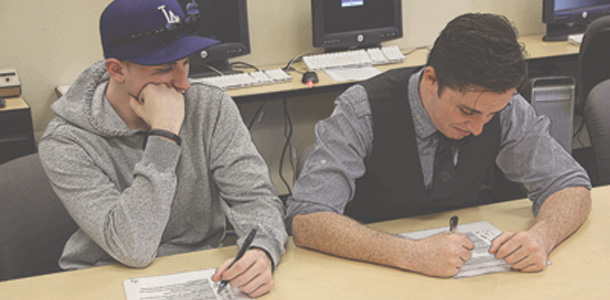The Academic Integrity Committee is a group of faculty and administrators at Cosumnes River College committed to improving the quality of education for students by addressing issues within the educational process.
During the course of the 2011-2012 school year the AIC handled 34 reports of cheating and 57 reports of plagiarism at CRC, according to the student discipline referral report.
“If we are going to take an honest look at ourselves and become the college we can be, which is a better college than what we are, we’ve got to be honest and accurate,” said ethics professor Rick Schubert.
Schubert was the founding chair of the AIC and served as chair for five years. He said that there are people who believe that academic integrity applies only to the students at CRC but it is equally applicable to the faculty and administrators.
“I think it’s really easy for folks on my side of the desk to think academic integrity is about what the students need to do or not do,” Schubert said. “The way I see it, whether Cosumnes River College is an institution that has integrity or not depends as much or more on what I as a member of the faculty do.”
Most students know how academic integrity applies to them and agree that it is equally important for faculty.
“It kind of sets an example for students as well,” said Kyle Richards, 20, a philosophy and religious studies major. “It’s not just the students that have to be held to some kind of standard.”
The committee meets approximately three times per semester to discuss ways to improve academic integrity, said David Weinshilboum, an English professor and the current chairman.
“Academic integrity is the way we expect students to carry themselves in academia while here at CRC as students, we hold them to a higher standard,” Weinshilboum said. “Everybody here, from faculty and administrators, should hold ourselves to that standard.”
Many students agree with Weinshilboum and believe it is a standard that everyone on campus should be held to.
“I like it because it holds everybody accountable not just the students,” said Gospel Cruz, a 21-year-old general business major.
Plagiarism and cheating are issues that are addressed with students each year.
“Cheating is very, very serious,” Weinshilboum said. “Too often students are not made aware of how significant that is.”
Others are unaware of what academic integrity means. While avoiding plagiarism is often discussed in class some students don’t know that it is one piece of academic integrity.
“They just tell us not to plagiarize,” said Juana Suarez, a 20-year-old undeclared major. “They don’t use the [term] academic integrity.”
When a student is found by their professor to have cheated or plagiarized their work there is a protocol, Weinshilboum said. There is a student conduct violation form that is filled out and sent to administrators.
Each individual case is unique and therefore there is no one answer as to what happens to students who are found to have cheated or plagiarized.
If a student is found in violation of school policy or academic integrity and receives some sort of disciplinary action, they have the ability to appeal the decision. The appeals board, which is a subcommittee of the AIC, meets on an as needed basis to review each case.
“Our approach is very much an attempt to educate as much as it is to punish,” Weinshilboum said.
Not only is cheating and committing plagiarism a breach of academic integrity, it’s something that students shouldn’t want to do, Weinshilboum said.
“You have something important to say, your ideas, your experiences, are relevant and important,” Weinshilboum said. “If you, for some reason, decide to take some somebody else’s ideas and opinions and pretend that they are yours, you’re negating your own ideas. You are allowing someone else to speak for you and to me that’s the real tragedy.”

